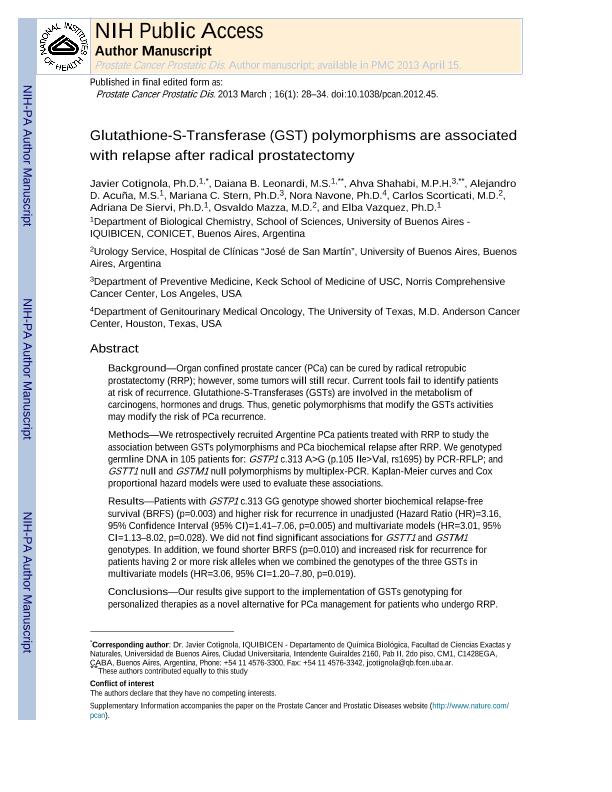Artículo
Glutathione-S-transferase (GST) polymorphisms are associated with relapse after radical prostatectomy
Cotignola, Javier Hernan ; Leonardi, Daiana Beatriz
; Leonardi, Daiana Beatriz ; Shahabi, A.; Acuña, Alejandro Daniel
; Shahabi, A.; Acuña, Alejandro Daniel ; Stern, M. C.; Navone, N.; Scorticati, C.; de Siervi, Adriana
; Stern, M. C.; Navone, N.; Scorticati, C.; de Siervi, Adriana ; Mazza, O.; Vazquez, Elba Susana
; Mazza, O.; Vazquez, Elba Susana
 ; Leonardi, Daiana Beatriz
; Leonardi, Daiana Beatriz ; Shahabi, A.; Acuña, Alejandro Daniel
; Shahabi, A.; Acuña, Alejandro Daniel ; Stern, M. C.; Navone, N.; Scorticati, C.; de Siervi, Adriana
; Stern, M. C.; Navone, N.; Scorticati, C.; de Siervi, Adriana ; Mazza, O.; Vazquez, Elba Susana
; Mazza, O.; Vazquez, Elba Susana
Fecha de publicación:
03/2013
Editorial:
Nature Publishing Group
Revista:
Prostate Cancer And Prostatic Diseases
ISSN:
1365-7852
Idioma:
Inglés
Tipo de recurso:
Artículo publicado
Clasificación temática:
Resumen
BACKGROUND: Organ confined prostate cancer (PCa) can be cured by radical retropubic prostatectomy (RRP); however, some tumors will still recur. Current tools fail to identify patients at risk of recurrence. Glutathione-S-transferases (GSTs) are involved in the metabolism of carcinogens, hormones and drugs. Thus, genetic polymorphisms that modify the GST activities may modify the risk of PCa recurrence. METHODS: We retrospectively recruited Argentine PCa patients treated with RRP to study the association between GST polymorphisms and PCa biochemical relapse after RRP. We genotyped germline DNA in 105 patients for: GSTP1 c.313A4G (p.105 Ile4Val, rs1695) by PCR-RFLP; and GSTT1 null and GSTM1 null polymorphisms by multiplex PCR. Kaplan–Meier curves and Cox proportional hazard models were used to evaluate these associations. RESULTS: Patients with GSTP1 c.313GG genotype showed shorter biochemical relapse-free survival (BRFS) (P ¼ 0.003) and higher risk for recurrence in unadjusted (Hazard ratio (HR) ¼ 3.16, 95% confidence interval (95% CI) ¼ 1.41–7.06, P ¼ 0.005) and multivariate models (HR ¼ 3.01, 95% CI ¼ 1.13–8.02, P ¼ 0.028). We did not find significant associations for GSTT1 and GSTM1 genotypes. In addition, we found shorter BRFS (P ¼ 0.010) and increased risk for recurrence for patients having two or more risk alleles when we combined the genotypes of the three GSTs in multivariate models (HR ¼ 3.06, 95% CI ¼ 1.20–7.80, P ¼ 0.019). CONCLUSIONS: Our results give support to the implementation of GSTs genotyping for personalized therapies as a novel alternative for PCa management for patients who undergo RRP. To the best of our knowledge, this is the first study that examined GST polymorphisms in PCa progression in Argentine men. Replication of our findings in larger cohort is warranted.
Archivos asociados
Licencia
Identificadores
Colecciones
Articulos(IQUIBICEN)
Articulos de INSTITUTO DE QUIMICA BIOLOGICA DE LA FACULTAD DE CS. EXACTAS Y NATURALES
Articulos de INSTITUTO DE QUIMICA BIOLOGICA DE LA FACULTAD DE CS. EXACTAS Y NATURALES
Citación
Cotignola, Javier Hernan; Leonardi, Daiana Beatriz; Shahabi, A.; Acuña, Alejandro Daniel; Stern, M. C.; et al.; Glutathione-S-transferase (GST) polymorphisms are associated with relapse after radical prostatectomy; Nature Publishing Group; Prostate Cancer And Prostatic Diseases; 16; 3-2013; 28-34
Compartir
Altmétricas



